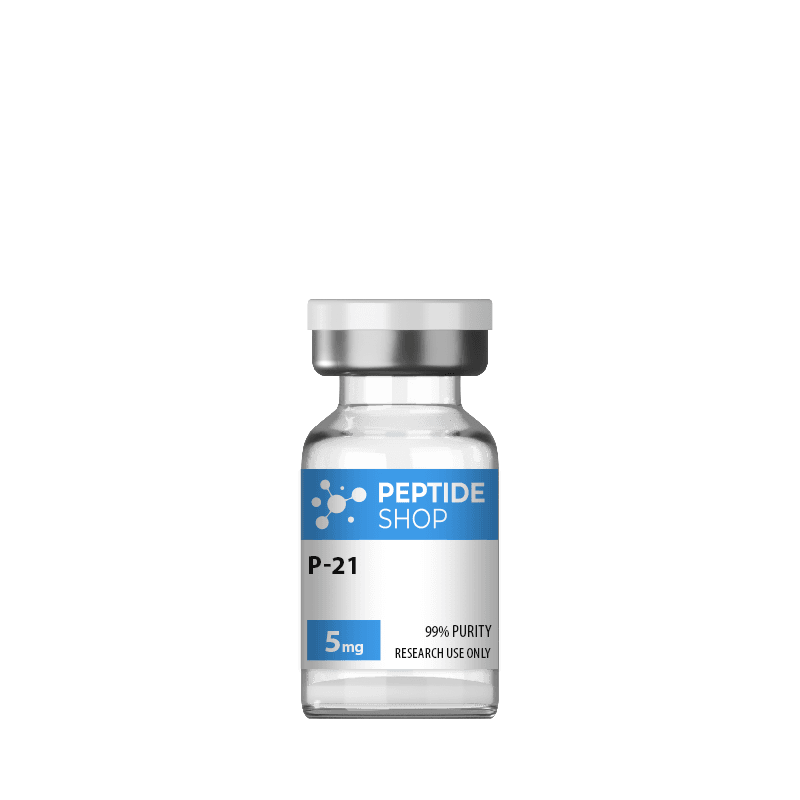Size: 5mg
Contents: P-21
Form: Lyophilized powder
Purity: >99%

Size: 5mg
Contents: P-21
Form: Lyophilized powder
Purity: >99%
SHARE:
Products sold on our website are designed for in vitro testing and lab experimentation exclusively.
All the products you see on the website are being sold in a lyophilized powder state (freeze-dried), in a sealed sterile vial; and should be reconstituted.
The product’s label clearly states the amount of product a vial contains; some products are offered in different variations.
The products we are selling come in a sealed vial but require additional lab equipment for proper testing.
P21 is a synthetic type of peptide that mimics the action of ciliary neurotrophic factor (CNTF). This factor is actually a protein and is crucial because it allows the survival and progression of brain tissue cells, primarily neurons and oligodendrocytes. It is believed that this protein can potentially have a neuroprotective effect, which is key to its potential therapeutic effect.
By mimicking the action of CNTF, P21 is also considered a potential part of the therapy for various brain tissue diseases, such as Alzheimer's disease (a primary cause of dementia in the elderly population). In addition, this amino acid sequence may improve hippocampal-dependent learning and memory and increase neurogenesis (the formation of all types of nerve cells). Improved cognitive function and increased levels of proliferation are just some of the possible beneficial effects. It is crucial that P21 does not cause allergic reactions and passes through the blood-brain barrier.
Alzheimer's disease (AD) is a serious neurodegenerative disorder that causes dementia (memory loss). However, there is still no adequate cure or therapy for this disease. Some studies have investigated the secondary prevention of neurodegeneration with the neurotrophic compound P21 in mice. To determine its potential clinical use, scientists tested the application of this peptide in mice during a period when there is no clear pathology (the time of synaptic compensation).
Scientists started continuous treatment with P21 in female mice and monitored its effect 9, 15, and 18 months after treatment. Cognitive improvement was studied by assessing episodic memory. The results suggest that treatment with the P21 peptide, if started during synaptic compensation, can prevent neurodegeneration. Most importantly, episodic memory can be preserved this way, significantly reducing mortality rates. The way P21 actually functions is by enhancing neurogenesis and synaptic plasticity. So, administering this peptide may be able to improve the health of the neural network and even prevent AD.
Numerous other studies have had similar results and have generally shown that P21 increases neurogenesis and neuronal plasticity (AD patients always have decreased levels of these parameters). Crucially, P21 did not induce any immune response in rats in any of the studies. Together, these researches demonstrate the therapeutic potential of P21 as a compound that can modify the disease and prevent its progression.
Cognitive impairment occurs as a consequence of neurodegenerative diseases such as Alzheimer's disease, Parkinson's disease, and many others. P21 has shown potential benefits in addressing problems with cognitive function.
Peptide was administered during the diet, continuously for 3 months, and during the period of synaptic compensation (6–9 months before the obvious pathology.) The experimental animals used in the study were mice. The main parameter in this study was the monitoring of cognitive performance, but also the effect on neurogenesis, dendritic, and synaptic markers.
The results showed that P21 may be able to rescue deficits of the dendritic and sympathetic type and enhance neurogenesis. The main parameter (cognitive performance) could be completely reversed and greatly improved even if damage was present, as shown in the mice model. Furthermore, it has also been shown that plaque deposition begins around 9 months in the neocortex and spreads to the hippocampus around 12 months. The disease progresses further with the formation of neurofibrillary tangles at 12 months in limbic areas and spreads to other brain regions later. Only female mice were used in the study because, as in humans, they show a more aggressive pathology with earlier cognitive impairment and a stronger and earlier deficit in neurogenesis. Understanding the course of the disease and how it progressed in the mouse model, makes it clear why peptide treatment was initiated after only 3 months.
Age-related macular degeneration (AMD) is one of the most common neurodegenerative diseases and eventually leads to vision loss, which is the final stage. The elderly population often suffers from this disease. However, no treatment or effective cure has been found so far, nor has there been a way to prevent this disease.
Nevertheless, many studies have investigated the effect of P21 peptide on this disease. The experimental animals used for this study were aged rats and mice. In the affected animals, photoreceptor degeneration, lipofuscin granules, vacuoles, and atrophy in the retinal pigment epithelium, were observed. Bruch's membrane thickening was also present, and a rosette-like structure was most characteristically observed.Microgliosis and astrogliosis were shown in different layers of the retina. However, all pathological changes and parameters listed above were significantly improved after three months of P21 peptide administration.
The results of this and related studies only further indicate the therapeutic potential of this compound for the treatment and prevention of this serious disease. Other retinal changes associated with aging and Alzheimer's disease may also be treated with this peptide.
P21 is a peptide that, according to studies, is showing more and more beneficial effects. Over time, it has been studied most in nervous tissue, where the most progress has been made. Numerous researches have shown its potential positive properties in the treatment of neurodegenerative diseases such as Alzheimer's disease and Age-related macular degeneration. This peptide may also be able to restore cognitive impairment caused by various neurological diseases and improve memory in cases of dementia (which always happens with Alzheimer's disease). P21 is a peptide that will certainly be studied more in the future, given all the beneficial effects it has shown so far.
Resources:
Useful links